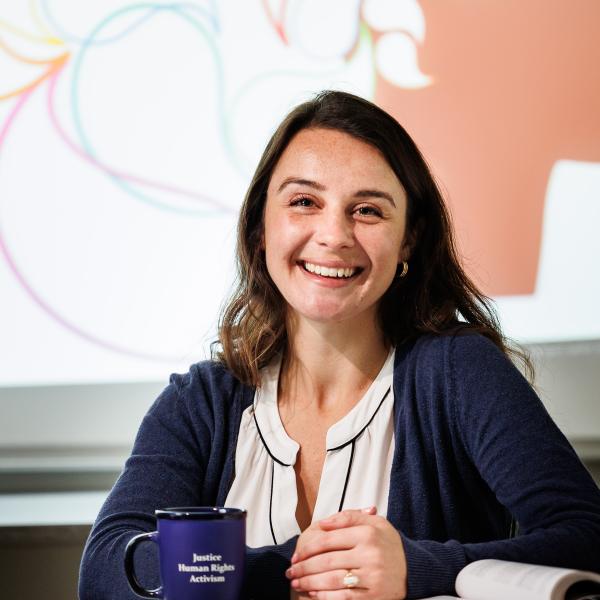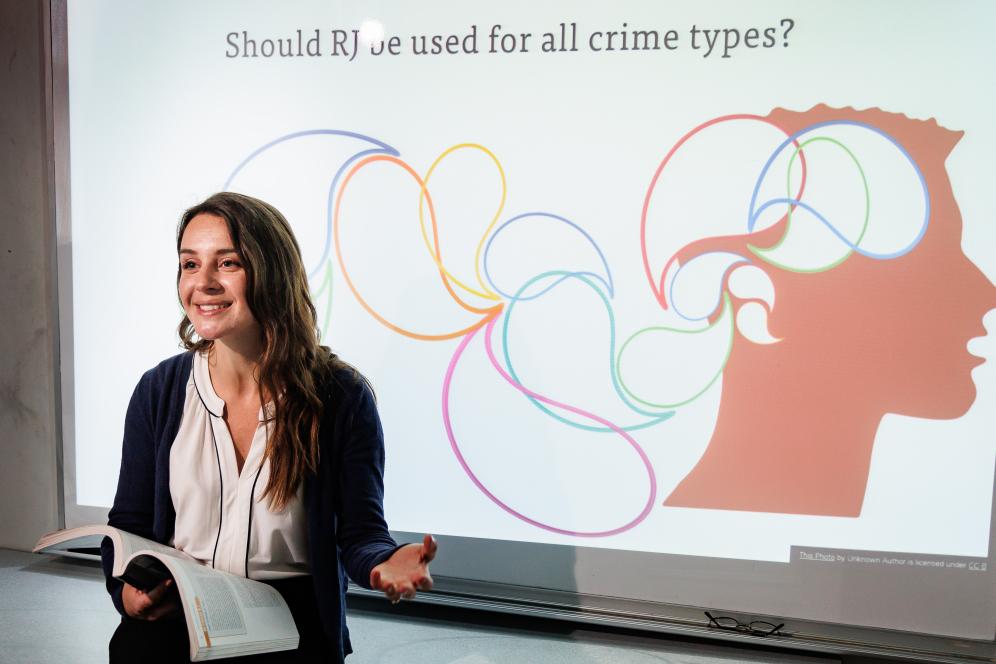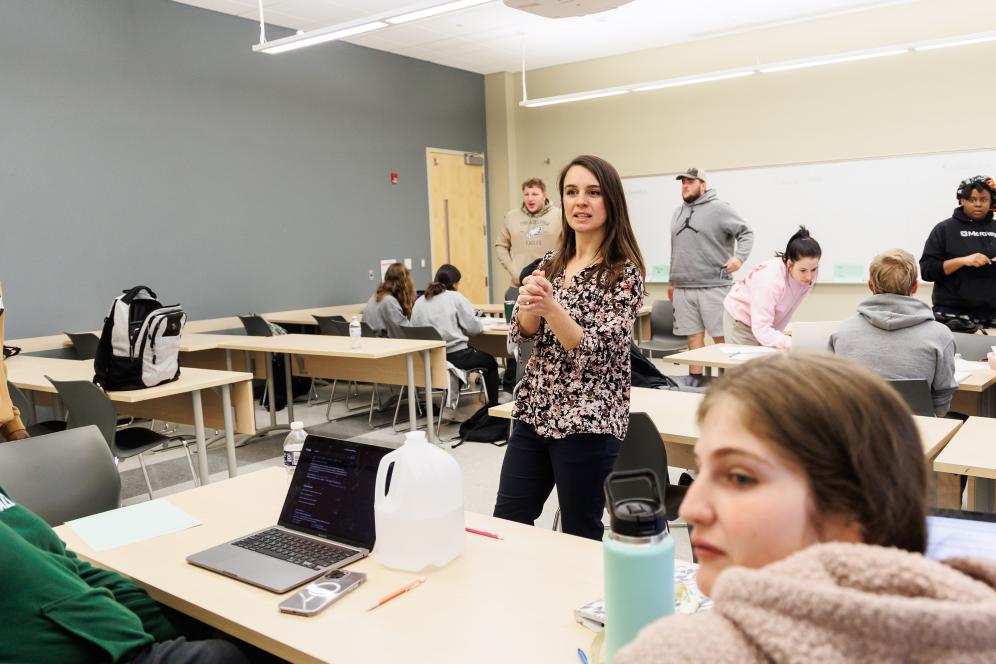
Chair and Assistant Professor of Criminal Justice
What is your educational background?
I went to Lycoming College as an undergraduate student, where I received a B.A. in Criminology with a minor in Psychology. After working at an alternative to incarceration program for justice-involved youths for a year, I returned to school to pursue my Master’s and Doctorate at the University of Delaware, where I received a M.A. in Criminology and a Ph.D. in Criminology with a specialization in Criminology, Law and Society. During my time at the University of Delaware, I also worked as a researcher at the Center for Drug and Health Studies, where I worked on various correctional research studies, including the Prison Research and Innovation Network project. All of these experiences have really shaped who I am today as an assistant professor and as a researcher.
What brought you to DelVal?
I had always known that I wanted to teach at an institution that offered students a close-knit community where faculty members are truly invested in the success of every student. I was immediately drawn to DelVal due to its emphasis on student learning and growth and the close relationships built between students and faculty. Also, my father and my grandfather are farmers on Long Island, NY, so I really loved DelVal’s history with being founded as a National Farm School.
As soon as I stepped foot onto campus three years ago, I knew that this was where I wanted to be and I consider myself so lucky to be a part of this community.
How do you harness the experiential learning pillar of Delaware Valley University and apply that to your everyday teaching?
I firmly believe that learning by doing is one of the most critical elements of a student’s education. Hands-on learning experiences provide students with the opportunity to apply concepts and skills inside as well as outside of the classroom environment through career exploration activities, through service and volunteering, or through internships in our E360 program. With that being said, I strive to infuse meaningful experiential learning activities into my everyday teaching by incorporating guest speakers, case studies, research, field trips, training webinars, and service opportunities into my courses. For example, in my Victimology class, I include an Aggies in Action assignment, which tasks students with participating in local community events or trainings, such as A Woman’s Place Candlelight Vigil or LOVE is the Answer Day in Bucks County, among others. These experiential learning experiences are so powerful because they demonstrate a connection between classroom learning and everyday practice within the criminal justice field.


What brings you the most satisfaction in your job?
My favorite part about my job is being able to work with students. DelVal students are engaging and thoughtful and truly make my job more fulfilling. I not only get to share my passion for criminal justice with students, but I get to learn about my students’ passions and offer them guidance and support as they pursue their goals. Seeing my students grow and achieve their goals is one of the most rewarding aspects of my job.
Do you have any student success stories that stand out to you?
There are honestly too many to count. So many of my students come into the criminal justice program with a specific career goal in mind, but after participating in an internship or taking a few classes within that desired area, they realize it is not something they actually want to do. I work with these students to explore other potential areas of interest in the criminal justice field and help to develop a new path forward for them. One student comes to mind. He really struggled with figuring out what he wanted to do with his criminal justice degree. At first, it was law enforcement, then he considered graduate school, but after taking my Philosophical Issues in Criminal Law course, he decided to pursue law school and was accepted into several law schools. While his journey was filled with moments of doubt and what-ifs, he worked hard and found an area of the criminal justice system that he is passionate about, so I would say that is a success story that stands out to me. As I stated previously though, there are so many student success stories in my short time at DelVal where students showed resilience and persistence when chasing their dreams, so being a small part in those journeys is always rewarding for me.
What are the characteristics of a successful student at DelVal?
I really believe that success is difficult to define because it can be unique to each and every student. DelVal students bring their own experiences and perspectives to campus, which enriches classroom discussions and learning. Each student’s journey at DelVal is distinct, but I believe that resilience and a passion for learning are extremely important elements to a student’s success. I think it is important for me as a faculty member, advisor, and mentor to support students along their individualized journeys to success.
How do you describe DelVal and the DelVal student from your perspective?
I would describe DelVal as a home away from home. The DelVal community feels like family because we are such a close-knit campus that truly cares for one another. I also would describe DelVal as a campus full of school spirit and pride, just look at A-Day or homecoming.
If I had to describe DelVal students, I would say they are creative, thoughtful, innovative, and resilient. DelVal students provide a fresh and new perspective to campus. They are willing to ask the difficult questions and provide innovative solutions to challenges we are facing. They are passionate about their dreams and goals. Overall, I would say that the students truly make DelVal a special place.
Are there any specific activities or initiatives you prioritize when mentoring DelVal students?
In my role as a mentor and an advisor, I am always striving to empower my students by providing them with meaningful information and resources so they are able to make informed decisions about their future. In doing so, I offer support and guidance in order to make sure that students feel that they are being advocated for and supported. When preparing to enter the workforce or graduate school, I always work diligently with my mentees to ensure that their resumes and application materials are prepared. I also work to connect my mentees with professionals within their desired career path to help build their professional network. Overall, I would say that my main focus in mentoring is to provide a safe space for students to ask questions, to create a plan, to share their successes and challenges, and to develop solutions and informed decisions.
If you were a YouTube or TikTok influencer, what would the subject of your channel or content be about? (specific hobby? Knowledgeable about a topic? travel, food, gardening, exercising, etc.)
I am not a social media person, but if I was, I would want to either have a channel about how Long Island bagels are the best or a channel about best places to go skiing. I am a Long Island native, so I am very particular about my bagels, so I think it would be fun to go around to different establishments on Long Island to rate the different bagels and provide recommendations. Also, I started skiing when I was three years old. Skiing is one of my favorite hobbies to do with family and friends, so it would be fun to share some of my favorite ski spots, like Whiteface Mountain in Lake Placid among others.
About Dr. Megan T. Demarest
Dr. Megan T. Demarest teaches Criminal Justice and is chair of the Criminal Justice Department at DelVal. She has worked previously at an alternative to incarceration program for youths for court-mandated rulings, and as a researcher and project coordinator evaluating prison programming. She serves as a member of the Bucks County Reentry Coalition. Her teaching interests and research areas focus on corrections and reentry experiences. She provides experiential learning opportunities to her students by incorporating guest speakers, case studies, research, field trips, and service opportunities.